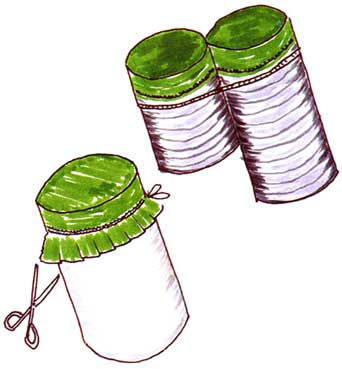|
|
 |
TOM-TOMS
ONCE UPON A TIME...
I don’t know if you know this, but the first telephone conversation ever made in Portugal was sent between the Meteorological Observatory at "Escola Politécnica" and the Astronomical Observatory at “Tapada da Ajuda”, in November 1877, using a 3 km long telephone line. Alexander Bell had invented the telephone just over a year before this. It was however, the drum, or a hollow tree trunk that had originally been used for communications between men and women, many thousands of years earlier. When I was still a young lad, we talked on the phone using two empty tins of shoe polish and a piece of string, because courting certainly wasn’t an easy business at all.
MATERIAL NEEDED
Two tins cans of different sizes, a piece of string roughly two meters long, a sheet of strong plastic and a length of sturdy sewing thread.
TOOLS AND ACCESSORIES
A pair of scissors.
HOW TO MAKE THE INSTRUMENT
Tie the plastic to each of the two cans and stretch it tight. This operation should be performed by two people: one of you doing the tying, whilst the other keeps the plastic stretched tight. When the two cans have the plastic stretched over them, tie one can to the other, 50 that the plastic sheets are at the same height.
DECORATION
As far as the decoration of your instrument is concerned, the artwork is up to you, but be careful not to rum everybody’s ears at home. Playing the drum is not about making a noise. Learn to play your TOM-TOMS to the rhythm of a tune that you like. Don’t forget this advice and be careful with your ears. Deafness is a terrible illness and listening to music too loud can damage your ears.
HOW TO PLAY THE INSTRUMENT
It is important to remember that your TOM-TOMS must have the plastic .sheet stretched tight. Tap out a rhythm with the tips of your fingers on the 1argei drum and then on the smaller one or vice-versa. Hold your Tom-Toms between your legs, so that you can use both your hands to play them. Now try to follow the rhythm of a song.
